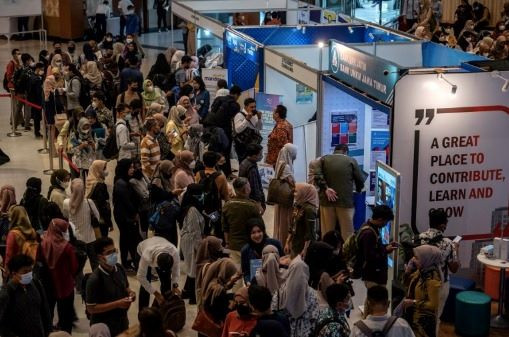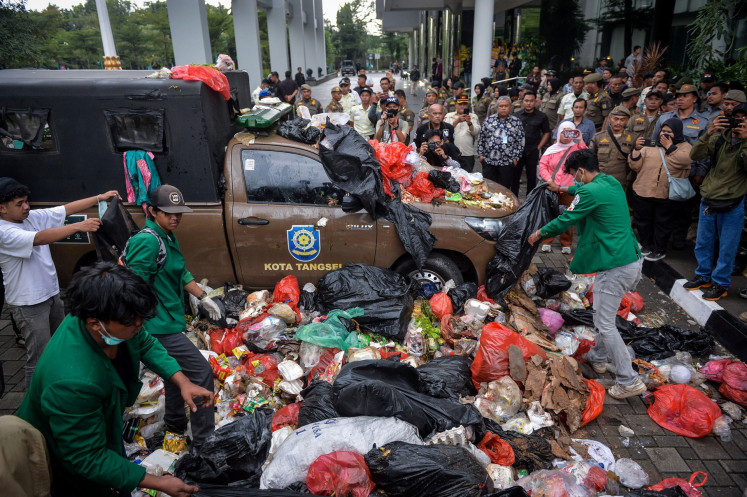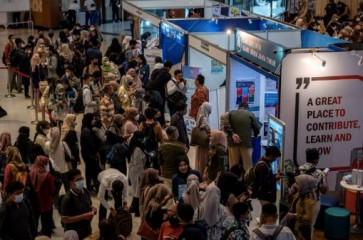Popular Reads
Top Results
Can't find what you're looking for?
View all search resultsPopular Reads
Top Results
Can't find what you're looking for?
View all search resultsIndonesia’s demographic bonus and the productivity imperative
The employment structure in Indonesia is imbalanced, with 33.67 percent of workers in part-time jobs and 59.33 percent in the informal sector, often without job security, social protections or access to skill development.
Change text size
Gift Premium Articles
to Anyone
 Looking up: Crowds of job seekers attend a job fair on March 7, 2023, in Surabaya, East Java. Data from Statistics Indonesia show that open unemployment in the country was 4.82 percent of the 149.38 million-strong workforce in February 2024, down 0.63 percent compared with the same period last year. (Antara/Juni Kriswanto)
Looking up: Crowds of job seekers attend a job fair on March 7, 2023, in Surabaya, East Java. Data from Statistics Indonesia show that open unemployment in the country was 4.82 percent of the 149.38 million-strong workforce in February 2024, down 0.63 percent compared with the same period last year. (Antara/Juni Kriswanto)
I
ndonesia is currently experiencing a demographic bonus, meaning a period when the working-age population significantly outnumbers dependents. With 70.1 percent of its 280 million citizens in the productive age group and a total labor force of 152.1 million in 2024, according to Statistics Indonesia (BPS), this phase represents a rare opportunity to accelerate economic growth.
But despite favorable demographics, Indonesia’s labor productivity remains low. In 2024, output per worker stood at just US$15.12, far behind Malaysia ($29.67) and South Korea ($48.57). Although the economy has grown around 5 percent annually since 2015, productivity rose only 2.5 percent per year, showing that growth is driven more by labor and capital inputs rather than by efficiency.
A more pressing issue is the incremental capital output ratio (ICOR), which reached 6.3 in 2024, signaling inefficient investment. Without significant gains in total factor productivity (TFP), which currently contributes just 35 percent to growth (compared with 60 percent in South Korea and 50 percent in China), economic progress will remain constrained.
Several structural barriers hinder productivity gains. First, human capital is underdeveloped; only 13.5 percent of the labor force have higher education, while over 50 percent are limited to elementary or junior high school education, leaving the workforce ill-equipped for high-value industries.
Second, the employment structure is imbalanced, with 33.67 percent of workers in part-time jobs and 59.33 percent in the informal sector, often without job security, social protections or access to skill development, according to BPS.
Third, innovation capacity is weak. Indonesia invests only 0.3 percent of its gross domestic product (GDP) in research and development, far below the level needed to drive technological advancement and competitiveness.
Lastly, governance issues persist. With a Transparency International Corruption Perception Index score of 34, ineffective institutions and bureaucratic delays continue to undermine reform and erode public confidence.


















